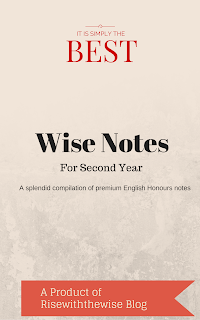C.U. English Honours Notes for the 'The Tyger' by William Blake.
“The Tyger”----Critical Appreciation/ Meaning/ Blessing of childlike innocence and adult wisdom/ Two Contrary States of Human Soul.
“The Tyger”----Critical Appreciation/ Meaning/ Blessing of childlike innocence and adult wisdom/ Two Contrary States of Human Soul.
William Blake’s The Tyger
has always remained a popular poem not only to the critics but also to the
readers of different ages. Like most of Blake’s songs this poem can also be
appreciated at different levels. At its simplest reading, the poem attracts us
with its string rhythm and simple image are also compelling that we feel the
presence of an awful power lurking in the dark. For many readers this physical
sensation seems to be an adequate response and they do not wish to explore the
poem’s deeper layers of meaning and symbolism.
Blake himself, however, wanted his
readers not only to enjoy the series of “Songs of Innocence” and “Songs of
Experience” as mere songs, but also to understand their relevance as belonging
to “two contrary states of human soul”. This contrast means much to Blake and
we cannot ignore this contrast while we read his songs. Actually the two
sections of innocence and experience are the two contrasted elements in a
single design. The first part sets out an imaginative vision of the state of
innocence, and second shows how life challenges, corrupts and destroys it
innocence is brimming with joy and harmony, experience is dark and sinister.
But in Blake’s scheme there is a further stage in which innocence may be wedded
to experience, goodness to knowledge. Blake holds that innocence uncoupled with
the experience is incomplete. He says, “The wrath of lion is the wisdom of
God”. C.M. Bowra has pointed out. “ The wrath which Blake found in Christ, his
symbol of the divine spirit which will not tolerate restrictions but asserts
itself against established rules, was the means by which he hoped to unite
innocence and experience in some tremendous synthesis”. But such a synthesis is possible only through
passion, power and energy. That is why Blake stressed the great forces hidden
in life, terrifying but necessary for that synthesis. He chooses his symbols
for the power in violet and destructive objects. It is in such elemental forces
that Blake puts his trust for redemption of mankind.
If we are to get the full force of
the poem The Tyger, we have to read it in this context. The poem is a
symbol of Blake for the terrible forces in the human soul, which can ultimately
break the bond of experience. The forest of the night in which the tiger roams
is the darkness of ignorance, repression, superstition and depravity. This
incarnation of terrible energy has been fashioned by unknown supernatural
forces that beat out the living world with their hammers. The poet wonders and
makes us ask such awe-struck queries:
“What immortal hand or eye
Could frame thy fearful symmetry?
--------------------------------------------
What dread hand? And what dread feet?
What the hammer? What the chain?”
Through this relentless series of
wonder-filled questions, Blake builds up the enormous store of force, energy
and power of the tiger as a symbol of the hidden power in man to overcome
corruption and privation. Then mention of the lamb as a symbol of innocence
makes us aware of the contrast between the two states of human soul. It also
intensifies our sense of awe at the stupendous act of divine creation. In fact,
it comes almost as a challenge to the idea of the benign Creator. Blake asks
almost with incredulous awe whether the Creator smiles with satisfaction in
what He had done.
But what Blake really suggests is
not really a change to the idea of the benign God, but he means to say that
benignity is not the only attribute of God. Kindness and terror are both the
attributes of the Divine Being and both are necessary for discovering the
Divine in man. That is perhaps why T.S. Eliot in Gerontion refers to Christ the
tiger. Thus gentleness and the tiger do not cancel each other; they can
co-exist in God and are equally valid.
Boost Your C.U. English Honours Preparation With 'Wise Notes'
We
also provide high quality C.U. English Honours notes with our
exceptional collection called 'Wise Notes'. Buy it and boost your
preparation for the upcoming examination. Wise Notes are available for
First and Second year student at highly affordable price.
Eager to buy Wise Notes: Click Here.
Wish to know more about Wise Notes: Click Here.
Get in touch with us for more information: Click Here.


